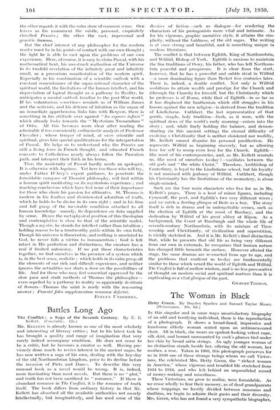Battles Long Ago
Ma. Km.t.r.rr is already known as one of the most scholarly and interesting of literary critics ; but to his latest task he has brought a quality and range of imagination that very rarely indeed accompany erudition. Ile does not cease to be a critic, but lie becomes a creator as well. Having pre- viously done much to revive interest in the ancient sagas, he has now written a saga of his own, dealing with the hey-day of the old Northumbrian kingdom, prior to its decline before the invasion of Picts and Danes. To describe this very unusual book as a novel would be wrong. It is, indeed, more fascinating than most novels. But there is no " plot," and truth has not been sacrificed to " romance." If there is abundant romance in The Conflict, it is the romance of truth itself. The book differs from ordinary history in that Mr. Kellett has absorbed all the available authorities not merely intellectually, but imaginatively, and has used some of the
devices of fiction—such as dialogue—for rendering the characters of his protagonists more vital and intimate. As for his vigorous, graphic narrative style, it attains the sim- plicity, without the baldness, of the old sagas. The writing is at once strong and beautiful, and is something unique in modern literature.
The conflict is that between Egfrith, King of Northumbria, and Wilfrid, Bishop of York. Egfrith is anxious to maintain the fine traditions of Oswy, his father, who has left Northum- bria peaceful and prosperous. It is clear front the start, however, that he has a powerful and subtle rival in Wilfrid —a more dominating figure than Becket five centuries later. There is, indeed, a double conflict. Not only is Wilfrid ambitious to attain wealth and prestige for the Church and (through the ('hurch) for himself, but the Christianity which he professes is of Rome, while that of Egfrith—in so far as it has displaced the heathenism which still struggles in his bosom against the new religion—is derived from the tradition of Lindisfarne. Cuthbert, the last representative of that gentle, simple, holy tradition—fresh, as it were, with the spiritual dews of the world's early morning—enters into the story ; and, while finely holding the balance, and demon- strating (in this ancient setting) the eternal difficulty of evolving a Christianity that is neither cloistered nor worldly, Mr. Kellett cannot disguise his personal predilection. He represents Wilfrid as beginning sincerely, but as allowing love for self to usurp even love for the Church. Egfrith- like most of his contemporarieS, and, as Mr. Kellett reminds us, like most of ourselves to-day h—vacillates between the old gods and " the white Christ." Theodore, Archbishop of Canterbury, is loyal to the Lindisfarne school, but his loyalty is not unmixed with jealousy of Wilfrid. Cuthbert, though his Christianity has the limitations of the monastery, is alone single-minded.
Such are the four main characters who live for us in Mr. Kellett's pages. There is a host of minor figures, including Cynewuif, the poet, and Egfrith's two very different wives ; and we catch a fleeting glimpse of Bede as a boy. The story itself is rich in drama and in unforgettable scenes, such as the election of Egfrith at the moot of Bardney, and the dedication by Wilfrid of his great abbey at Ripon. As a background, the Court at Bamburgh and the whole life of seventh-century Northumbria, with its mixture of Thor- worship and Christianity, of civilization and superstition; is vividly sketched in. And it is Mr. Kellett's final distinction that, ivhile he presents that old life as being very different from our own in externals, he recognizes that human nature has changed little beneath the surface. However alteied the stage, the same dramas are re-enacted from age to age, and the pioblenis that confront us to-day are fundamentally similar to those which vexed the world of Egfrith and Wilfrid: The Conflict is full of mellow wisdom, and is no less provocative of thought on modern social and spiritual matters than it is captivating as a vital glimpse of the past.
GILBERT THOMAS.
















































 Previous page
Previous page